|
|
|
Sort Order |
|
|
|
Items / Page
|
|
|
|
|
|
|
| Srl | Item |
| 1 |
ID:
112334
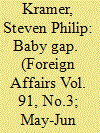

|
|
|
|
|
| Publication |
2012.
|
| Summary/Abstract |
Populations throughout the developed world are aging and shrinking, with dire consequences. Yet decline is not inevitable. Even in the industrialized world, governments can encourage childbearing through policies that let women reconcile work and family.
|
|
|
|
|
|
|
|
|
|
|
|
|
|
|
|
| 2 |
ID:
121587


|
|
|
|
|
| Publication |
2012.
|
| Summary/Abstract |
The substantial literature on mass violence, from ethnic cleansing to civil wars, has paid surprisingly little attention to the largest instance of mass violence in human history: the Holocaust. When political scientists have approached the subject, the trend has been to treat the Holocaust as a single case, comparing it-sometimes controversially-with other instances of genocide such as Rwanda or Cambodia. But historically grounded work on the destruction of European Jewry can help illuminate the microfoundations of violent politics, unpack the relationship between a ubiquitous violence-inducing ideology (antisemitism) and highly variable murder, and recast old questions about the origins and evolution of the Holocaust itself. After reviewing new trends in history-writing, I highlight opportunities for social-scientifically oriented research centered on the interaction of state power, local communities, and violent mobilization in five areas: military occupation, repertoires of violence, alliance politics, genocidal policymaking, and resistance. My conclusion addresses thorny issues of comparison, morality, and memory.
|
|
|
|
|
|
|
|
|
|
|
|
|
|
|
|
| 3 |
ID:
086887


|
|
|
|
|
| Publication |
2009.
|
| Summary/Abstract |
In Leslie T. Chang's 2008 book Factory Girls:From Village to City in a Changing China. the former Wall Street Journal reporter notes that the 130 million people on the move in China today represent the largest migration in human history, three times the number of people who immigrated to America from Europe over a century.
|
|
|
|
|
|
|
|
|
|
|
|
|
|
|
|
| 4 |
ID:
127306
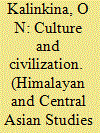

|
|
|
| 5 |
ID:
133071
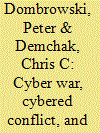

|
|
|
|
|
| Publication |
2014.
|
| Summary/Abstract |
It has been well over a decade since the first “prophets” of information warfare proclaimed a new age of conflict fought not just on air, sea, and land but with electrons in what came to be known as “cyberspace.”1 Since these early predictions, many incidents have confirmed that criminals, random hackers, and government-sanctioned specialists can wreak havoc on governments, military communications systems, and corporations. The Stuxnet worm alone helped delay-by months, perhaps years-the long-standing efforts of Iran to acquire sufficient nuclear material to build nuclear weapons.2 Recent revelations of hacking campaigns against such publications as the Wall Street Journal and New York Times have broadened concerns to include even the integrity of American democratic institutions.3 Meanwhile, the commander of U.S. Cyber Command has characterized cyber attacks designed to gain access to the intellectual property of American corporations as the “greatest transfer of wealth in human history.”
|
|
|
|
|
|
|
|
|
|
|
|
|
|
|
|
| 6 |
ID:
130802
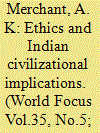

|
|
|
|
|
| Publication |
2014.
|
| Summary/Abstract |
The major civilizations of in human history have been associated with the major religious systems. Some
3,000 years ago Zoroastrianism was the religion of the "glory of ancient Persia," - the Persia that conquered" Babylon, Palestine, Egypt, and the Greek city-states. A few centuries later Judaism was the basis of Hebrew culture, which some philosophers such as Karl Jaspers regards as the greatest in history. And Jewish law has formed the I basis of common law and jurisprudence in countries all over the world. Western culture, until the rise of modem science, was dominated by Christianity. The teachings_ of Islam that burst upon world stage some 1400 years a go preserved and developed the Hellenistic heritage and gave algebra and other sciences. It was probably the greatest civilization the world had seen until the rise of the - Industrial Revolution began to transform Western culture. Today, the tumult of our age of transition is characteristic of the impetuosity and irrational instincts of youth. its follies, its prodigality, its pride, its self- assurance. its rebelliousness, and contempt of discipline.
|
|
|
|
|
|
|
|
|
|
|
|
|
|
|
|
| 7 |
ID:
106921
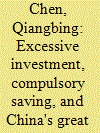

|
|
|
|
|
| Publication |
2011.
|
| Summary/Abstract |
This paper investigates the roles of excessive investment and compulsory saving in causing China's great famine during the period of 1959-1961. China initiated its ambitious industrialization campaign in 1958 under the false illusion that the agricultural sector would be able to provide sufficient savings. When the illusion proved to be false, a large number of industrial projects were left incomplete. However, since the economic returns for completing the half-done projects were high, central planners maintained high levels of grain procurement and urban labor force to complete these projects, even when famine became widespread. In addition, some political factors also contributed to the insufficient response by the central planners to the famine. The high grain procurement enforced by the State, compounded by other factors such as weather calamity, caused the most deadly famine in human history.
|
|
|
|
|
|
|
|
|
|
|
|
|
|
|
|
| 8 |
ID:
130827
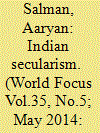

|
|
|
|
|
| Publication |
2014.
|
| Summary/Abstract |
"I believe in a religion based on universal and all-embracing principles which have always been accepted as true by mankind - the primeval eternal an religion, which means that it is above the hostility of all human an creels whatsoever. " - -Swami Dayananda Saraswati. There can be little debate on the In?uence of co Religion on Human History. The overwhelming impact of Christianity, Hinduism, Zoroastrianism, Judaism, or Islam on Civilization is seen not only in the cultural pl: semblance and value system which emerge from their - D2 teachings, but also re?ects in the effects they've had Ul on mankind. un an Believers and Unbelievers alike have acknowledged the profound in?uence of religion on ha individuals, societies and on humanity's collective life. the Religion was and is a power that's here to stay with above both the western and eastern hemispheres! that will On the other hand, Religion was and is still the considered a pariah' by Western Secularism! According are to historian R. Scott Appleby "Religion, at last, can no be longer be ignored". This was one of ?ve "unintended, unforeseen" consequences of 9/ l 1. HI In present day, challenges are manifold both co at domestic and at international level. Most political of con?icts end up passing through the prism of religion» pr. or ethnicity and are claimed to be the trigger factor in cl: many con?icts. The relationship between Religion and special Con?ict is complex.3'And Religion is at the heart of the Secularism Debate as Ethnicity and Religion have been an the building blocks of an lndividua1's Identity. Appleby hi: de?ned religion as 'the human response to a reality m: perceived as sacred
|
|
|
|
|
|
|
|
|
|
|
|
|
|
|
|
| 9 |
ID:
132487
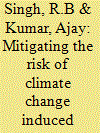

|
|
|
|
|
| Publication |
2014.
|
| Summary/Abstract |
The world's climate is continuing to change at rates that are projected to be unprecedented in recent human history. The risks of climate change and extreme climatic events such as drought and ?ood have dramatic impacts on economy and natural systems. Agriculture, livestock and water resources are among the most vulnerable systems. Resilience and adaptive capacity of traditional networks and land use systems to cope with climate variability/extremes are weakening, while ' frequency and magnitude of climate variability and land use intensity are in rise. Thus it is important to take timely action in order to reduce the risk of climate change.
|
|
|
|
|
|
|
|
|
|
|
|
|
|
|
|
| 10 |
ID:
128850
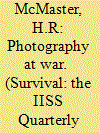

|
|
|
|
|
| Publication |
2014.
|
| Summary/Abstract |
A thematic selection and analysis of war photography across 165 years has tremendous explanatory power about the nature of modern war and the human experience in war and its aftermath. The year 2014 brings centennial commemorations of events that helped make the twentieth century the bloodiest in human history. Among these are the assassination of Archduke Franz Ferdinand on 28 June, Germany's invasion of Belgium and France on 4 August, and the First Battle of the Marne in early September - the battle that halted the German offensive and ushered in an unprecedented period of stalemated, destructive warfare on the Western Front. As historian Margaret MacMillan has observed, the First World War still haunts us not only because of the scale of the carnage and suffering, but because so many believed that the early-1900s version of globalisation and interdependence had rendered war futile. The comparisons to today seem obvious, as the United States and European nations cut military budgets based, in part, on the belief that large-scale armed conflicts are relics from a barbarous past. If, however, peace remains as the Ancient Greek historian Thucydides described it over 2,500 years ago - 'an armistice in a war that is continuously going on' - understanding war and warfare will remain important for preventing conflict, as well as for its effective conduct. Understanding war's human, psychological and social dimensions requires an interdisciplinary approach and study across multiple genres including literature, art, film and photography.
|
|
|
|
|
|
|
|
|
|
|
|
|
|
|
|
| 11 |
ID:
104535
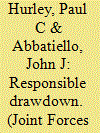

|
|
|
| 12 |
ID:
133500
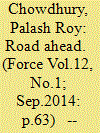

|
|
|
|
|
| Publication |
2014.
|
| Summary/Abstract |
It is well established that the Indian aviation sector has shown robust growth over the last decade and continues to offer significant potential for further growth in the coming years.
Aviation is a key infrastructure sector that is instrumental in the economy's development. It increases the pace of urbanisation and technology enhancement that leads to employment opportunities.
India continues to add more than 10 million people on an average to the workforce every year. Millions of people are migrating to urban centres in one of the largest urban exodus in human history. These megatrends, coupled with infrastructure investments and the advent of low cost airlines, are some of the key drivers of growth in travel and aviation sectors.
|
|
|
|
|
|
|
|
|
|
|
|
|
|
|
|
| 13 |
ID:
111118
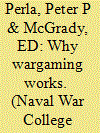

|
|
|
|
|
| Publication |
2011.
|
| Summary/Abstract |
Wargaming has a long history as an important tool for military training,
education, and research.
1
In its broader application to nonmilitary conflict situations (see, for example, the recent books Wargaming for Leaders and
Business War Games), the technique is increasing in popularity, particularly
among businesses seeking strategic advantages.
2
(As a result, we will sometimes
use the terms "wargaming" and "gaming" interchangeably; in the latter case,
however, we mean what is called "serious gaming," not the more general sense,
like gambling.)
3
Despite that history and popularity, however, wargaming's record of success is uneven. Some games seem to succeed very well in preparing important decision makers for real-world environments
in which they later find themselves.
|
|
|
|
|
|
|
|
|
|
|
|
|
|
|
|
|
|
|
|
|